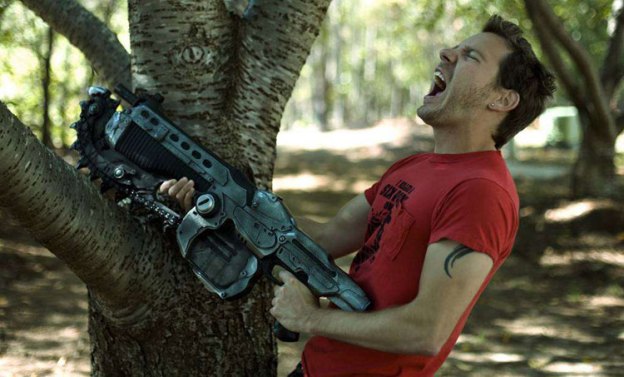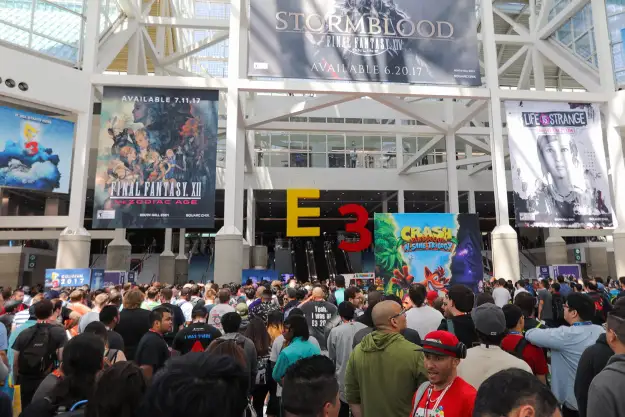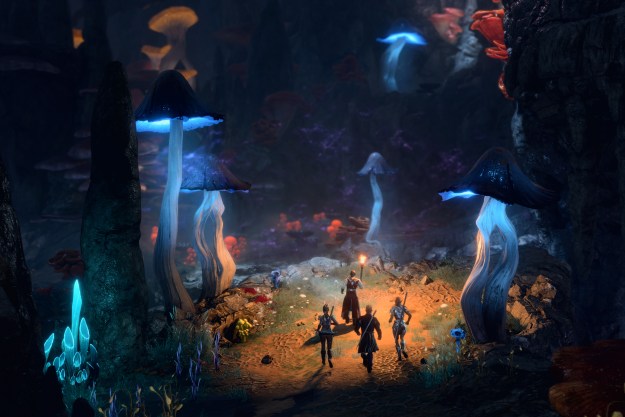
With sales of over 15 million games worldwide, an endless array of licensed merchandise, and a rock solid base of diehard fans, the Gears of War franchise has made its mark on the gaming industry. Now gamers are about to embark on the final adventure in the Gears of War trilogy come September 20. Cliff Bleszinski, one of the key creatives behind the franchise, has taken on great responsibility at Epic Games over the years. The design director dishes on the best way to get involved in the game industry, why game development has ruined his movie-watching experience, and how the Lancer made history in this exclusive interview.
What are some of the skill sets required to become a design director, and how did your own background prepare you for this role?
The skill set that I personally have is one that involves a lifetime of growing up with G.I. Joe, Transformers and sugar cereal. I played a heck of a lot of games growing up, and I had my share of hanging outside and doing normal kids stuff like playing “kick the can” and setting fires as a little troublemaker. Ultimately from there, I think writing skills and communication skills are very important. English classes, drama, architectural classes, CAD design, things like that. Ultimately, nobody really just lands in a position of designer. You start somewhere else. A lot of designers start as environment creators, or they start off as programmers first, and they evolve in that position because they know the tricks of the trade, so development team members just can’t blow smoke and confuse them. I’ve been in the trenches. I know that these kinds of things are doable, and I know how to push for them, and I know the process, and I have earned respect from years of development. So for those looking to get into the business, pick your craft, and kick and scream and claw until you get to that position that you ultimately want.

The path that a lot of people go through is testing. Why is that a good way “in” to game development?
A good way a lot of people use to get in the industry is testing, which is a ground-level job. In theory it sounds like a lot of fun. You just get to hang out and play games all day long, but in reality it’s a ton of work. Those guys really work their butts off in order to ship games and make sure that we have high-quality standards when the product comes out. Ultimately, if you land in test, you can evolve into an associate producer position, or if you prove you have design skills, maybe you can start crafting environments and sneak your way into the development team. But you’re there in the middle of it all, and you’re gaining experience through personal interactions, as well as through a certain amount of creative osmosis.
How important is being good at games for doing your job as design director?
Just to be good at videogames doesn’t necessarily mean that this will translate through to being a good designer. If you’re a person who loves food, it doesn’t necessarily mean you’ll be a good chef. Just because you like to drive fast cars doesn’t mean you’re qualified to be an engineer to build engines. It’s not a one-to-one kind of translation. One thing is knowing what the hardcore gamer wants, but also being able to step back and remove yourself to see how the average person would see a puzzle or see a gameplay situation. The key is to balance between a person who doesn’t even play games with a hardcore gamer. Those are the skills that are often underrated for this position.
How has your job impacted how you play games for fun in your spare time?
Being a gamer designer has in many ways ruined the experience of playing videogames, because I can’t play one without having a notepad next to my coffee table. I’m writing up notes on what I love and what I hate, and what I’d do differently and things like that. It’s just in my blood now, and even to some extent with the interactions I’ve had with Hollywood and film. I’m studying how things are shot, and dialogue, and pacing, and acting, and everything, when I watch a movie or TV show. It’s like once you start working in the creative business; it can spoil it a little bit for you.

Creatively, this process is a very iterative one, where everyone is adding ideas and you’re molding something together. The one thing that I will take claim for is the whole chainsaw bayonet thing, which I wanted to personally see in the videogame since 1998. I had an old game design back in the day where it was basically a circular saw that was attached to an AK47 design. Back then, we were working on the Unreal Tournament games, and that weapon never fit in. Finally, when we were crafting Gears as a new property in this new world, it was like, “Guys, I have to see a chainsaw bayonet,” and they were like, “Oh, that sounds kind of weird.” I’m like, “Come on, it’s a chainsaw and a gun,” and the art director at the time worked with the concept artist and came up with something cool. Ultimately, years later, we have what I hope and believe is one of the most iconic weapons in videogame history.
What are the challenges when it comes to making sequels?
Sequels are a very tricky business, because in many instances you are competing with the people’s nostalgia and their love of the first game, which in their mind was completely perfect and flawless…which is never the case. As the creative, all you see are the flaws in the last game, and what you didn’t get right, and the things you would change and tweak. So ultimately when you create a sequel, you’re kind of fighting against that kind of perception. But ultimately if you put in enough amazing cool new features, you remain true to the spirit of the original, and you get the support of the publisher, you can have a breakout hit. As a designer though, you have to know when to give people what they want creatively — more explosions, more awesome action, and a better story that’s even better written than the previous one.
How do you see the games industry evolving?
I think videogames are at a very interesting point right now where you have multiple factions. There’s the hardcore crowd playing Gears, Call of Duty, and Halo-type games, but then you also have your super casual moms playing Wii Sports and Wii Fit. People are very much afraid of that from the development side, like there’s not going to be any more hardcore games. But I believe there’s room for everything. There’s room for Disney movies. There’s room for movies like 300 and The Dark Knight. And the same can be said for games. The market is expanding, but it doesn’t mean that certain segments are drying up.
Make sure to check out our Gears of War 3 Review
Editors' Recommendations
- The long, winding road to Baldur’s Gate 3 was paved with these Larian games
- Persona 3 Reload leads a surprisingly strong batch of Xbox Game Pass additions
- Metal Gear Solid 3 and Silent Hill 2 remakes confirmed to launch in 2024
- 2023 set an incredibly high bar for video game sequels
- Best Metal Gear games, ranked


